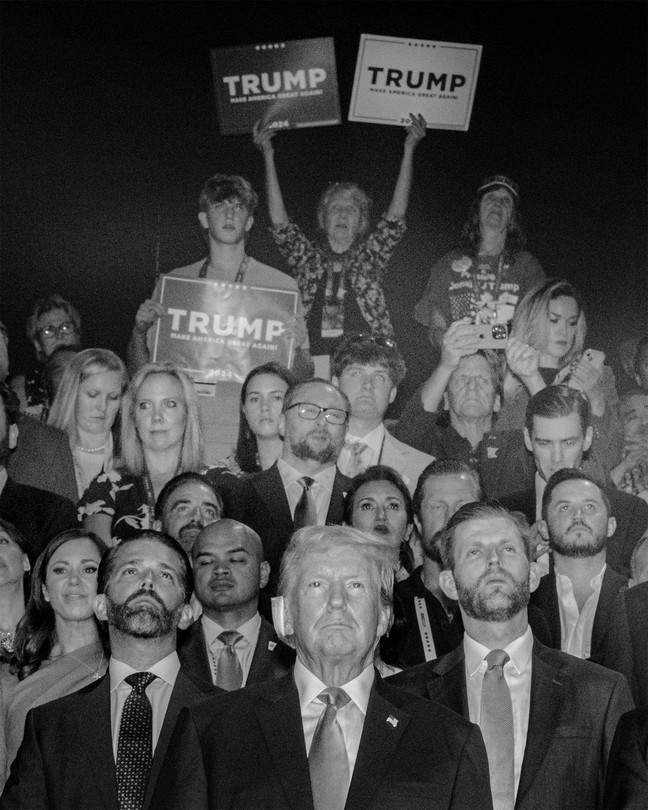For Republicans, Unity Means One Thing
4 min read
For a snapshot of our present political moment, imagine this: a 70-something woman in a bright-red sweater bobbing around a sticky dance floor at a bar in downtown Milwaukee. Thanks to the rain last night, the Jamboree at the RNC, the official celebration party on the first night of the Republican National Convention, was mostly empty. Still, DJ Milk N Cooks was in the corner, pumping out beats, and there was Susan, dancing with abandon, glittering flag earrings dangling from her ears. She’d come all the way from Texas as a guest of a convention attendee, she told me, and she was so happy. She’d been confident in the GOP candidate before, but now she knew: Trump had survived and would go on to win.
“If you didn’t believe in miracles before, now you do,” Susan, who declined to share her last name, told me. And if you didn’t believe in Trump? I asked, continuing the thought. “Now you do,” she said.
The word unity has been thrown around a lot at the convention in Wisconsin this week. After the shooting at his rally in Pennsylvania on Saturday night, Trump said he’d be rewriting his Thursday speech to focus on unity. Ambassador Nikki Haley, who wasn’t originally invited to speak at the convention, is now getting top billing for tonight’s program, in what appears to be a conciliatory gesture to the moderate wing of the party. Per the Trump loyalist Vivek Ramaswamy, Republicans “actually want national unity. Not some fake version, but the real thing.” These appeals for national comity did, now and again, seem to have a coercive edge.
After the attack on Trump, which left him with a bandaged ear but also resulted in a death and two serious injuries at the Pennsylvania rally, many convention attendees are calling for national togetherness. It’s a miracle that Trump survived the shooting, they say, and it’s time for all of America to stand together in the face of “evil,” as Trump called it. But what Republicans really seem to mean is that all of America now needs to stand together behind Trump.
This year’s convention is a mishmash of events occurring not only at the Fiserv Forum arena but also throughout Milwaukee’s downtown area, with each evening featuring a roster of brand-name GOP speakers. Yesterday, a series of welcome breakfasts and a screening of the new Dennis Quaid and Jon Voight movie, Reagan, preceded the evening’s events. People enjoyed themselves at a restaurant near the arena sponsored by CNN and Politico and, on the upper levels of the arena, drank cans of Spotted Cow, confident that the combination of Trump’s aging opponent and the former president’s own new status as a heroic survivor of political violence would ensure that he glides back into the White House in January.
Every national GOP convention intends to bring Republicans closer together. The occasion is supposed to provide an opportunity to look past differences, showcase burgeoning party talent, and just generally have a good time. “But this is a time where I think the message is ‘unity for the whole U.S.,’” Linda Ivell, a GOP activist from Bradenton, Florida, told me. Trump’s candidacy “is not just for Republicans. It’s for Democrats who’ve been abused too. It’s more of a common good for the country than a Democrat-Republican thing.”
Trump’s supporters know an act of God when they see one. How could you not interpret Trump’s survival as a miracle—and an indication of the kind of messianic leader he is meant to be? “There isn’t anybody that couldn’t think there was divine intervention. Because, less than five inches, the man would’ve been dead or brain-dead,” AJ Janson, an alternate delegate and a former state committeewoman from Sarasota County, Florida, told me in between speakers last night. “But he was saved by a little nod of the head at the right time.” At this point, Trump has been impeached twice, prosecuted, and shot at. “He is truly an American hero, and we all have to stand behind him,” Janson said.
Republicans believe that Trump’s brush with death has sent some new voters their way. His response to the shooting—to stand up, ear bloodied, and raise his fist—demonstrated true courage, they argue. Could Biden have done that? they ask. The assassination attempt “has caused everybody, or maybe most people, to reevaluate their positions,” Tom Trocine, a bearded Orlando man wearing camo Crocs, told me. “I know a bunch of independents, a bunch of libertarian people who were on the fence,” he added. “And now they are saying things that I hadn’t heard them say before”—that the Trump hatred had gone too far, that Trump deserved a second look.
The problem is that, so far, the convention’s speakers have not ratcheted down their rhetoric. Last night’s lineup included Senator Ron Johnson of Wisconsin, who called the Democratic Party a “clear and present danger,” and Representative Marjorie Taylor Greene of Georgia, who delivered a speech slamming undocumented immigrants and trans people and followed it with an interview accusing Democrats of murder.
At 9 p.m., after most of the speakers had finished, Trump made his first public appearance since the shooting, walking into the arena like a gladiator to battle, a white gauze bandage covering his injured ear. The Fiserv Forum erupted in cheers that rattled the stands. Unity was achieved—at least inside the arena. As Trump once again raised a fist, the delegates and attendees all returned the gesture, chanting “Fight! Fight! Fight!”



